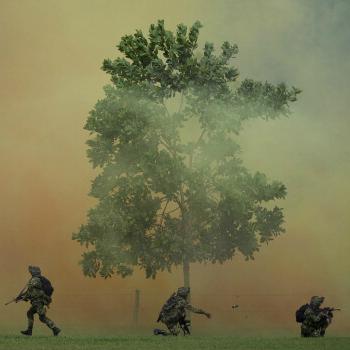*********** THIS IS A RUSHED, UNCORRECTED TRANSCRIPT **************
BOB: Two months ago we ran a segment about an explosive claim that had gone largely unreported: Allegations -- in a report commissioned for the peace process of Colombia’s long war with Marxist rebels -- that between 2003 and 2007, US military personnel and contractors had sexually abused many Colombian children.
[CLIP:]
GOODMAN: The investigator cites one case where 53 girls in the town of Melgar were targeted by contractors, who filmed the abuse and sold the films as pornography.
That was Democracy Now’s Amy Goodman. She was one of the few to pick up the story at the time, which was based on the report chronicling the long dirty war. Despite the horror of the scenario, most of the mainstream press ignored it, prompting many of our listeners to ask, “Why?” We wondered too, and interviewed a US reporter who had written about the allegation, and a left-leaning media watchdog who attributed the silence possibly to media deference to the Pentagon and indifference to Latin America. Fairness and Accuracy in Reporting’s Adam Johnson:
[CLIP:]
JOHNSON: I just found it curious that no one had mentioned it. The argument I make is that if this was a truth and reconciliation report about China or about Iran or about Russia in the Caucasuses, this would have been everywhere.
It would be an inexcusable failure if the story proved true. But it wasn’t true. Adrian Alsema is the founder and Editor of Colombia Reports. His post was the first to pass along the mass-rape allegation -- based on one professor’s contribution to that official historical report. While Alsema’s post did not get mainstream U.S. traction, it was loudly touted by Russia’s RT and Venezuela’s TeleSur, along with UK tabloid the Daily Mail. Meanwhile, Alsema himself sought to confirm what had been presented so unequivocally in the official history.
ALSEMA: Well first I tried calling the professor who put that claim in the report. That professor never responded to my calls or emails which got me very suspicious. After the initial publication I teamed up with Fusion, which is a daughter of Univision, their correspondent in Colombia, Manuel Orela, he actually went to Melgar to tlak to peple there to talk to the authorities, to tlak to people in the town. And we basically found out that the thing in the report, in the historic report, was basically an urban myth. And I felt responsible for having spread an urban myth.
BOB: Now the allegations were not based merely on gossip or whispers. There were actual porn videos made. And it's unclear how many people were involved and who was producing the videos. The allegation is that it was American personnel. What do we know about these videos?
ALSEMA: In 2004, videos were produced that were sold. I found out that there was involvement of actual professional American porn actors. In other videos there are unidentified men. And those could be US military personnel, however they could also be people from the oil industry. it's possible that US military personnel was involved, but we are talking about maybe one or two or three guys rather than maybe dozens. What we are looking at is that like over the past 15 years that the United States military has been highly active in Colombia, there has been an accumulation of credible allegations and these allegations need to be investigated.
BOB: So something isolated and unsavory was inflated into something vast, conspiratorial and grotesque. IT's not a non story, but it's not what it's been portrayed to be.
ALSEMA: Exactly and what happened is that rather than seeing that there were allegations from several parts of the country over a 15 years, they seem to have been condensed to one claim in which suddenly 53 girls were abused by military members. And that just never happened.
BOB: So, while we were here in the States, wondering aloud why there was so little reaction to your story, you were sitting there in Colombia fretting over the over reaction to your story.
ALSEMA: Exactly.
BOB: But of course, both Russia Today and TeleSur have an interest in embarrassing the united states, and it was a propaganda bonanza for them.
ALSEMA: It's kind of their purpose, isn't it? It's in their employer - the state's - interest to question the moral authority of the United States, I mean that's just their politics.
BOB: Exactly, it's like blaming a shark for feeding. But I'm curious about your own culpability, because after all, you ran this story based on the historical document ,without yourself checking it out.
ALSEMA: In an ideal world, I would have verified everything. the thing is that, like, when you look at my website, Colombia Reports, this is an indie operation. There are no funds or resources that could support such an extensive and almost forensic investigation of a claim, which I supposed a historic commission would have done. So, I mean I regret having published it, but then again I can't blame myself for being an independent journalist, and not having the funds to thoroughly investigate such claims.
BOB: One final thing, Adrian, now that you have clarified the record, has anyone along the trail gone back to clarify it as well?
ALSEMA: Um... no. And that's leaving me with a really bitter taste in my mouth because i investigated it myself when I found out that that claim was an urban myth, I very prominently published "That was an Urban Myth." And there was no follow up. You're the first American journalist I've talked to.
BOB: Ugh. Well thank you very much.
ALSEMA: No, thank you for letting me talk.
BOB: Adrian Alsema is the editor and founder of the English language Colombian website, Colombia Reports.
